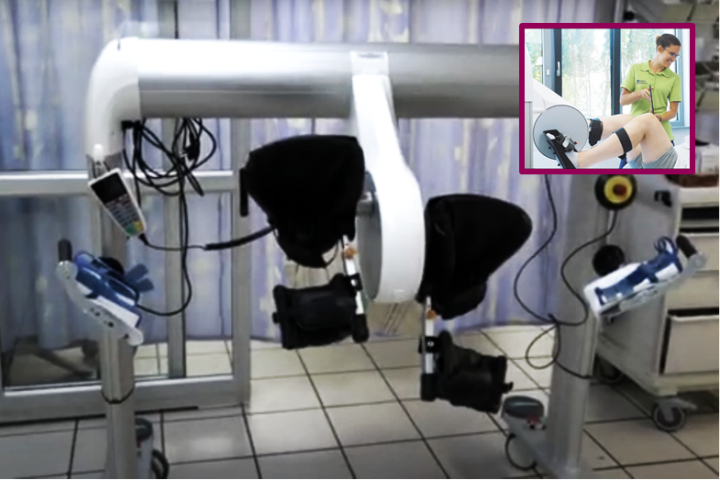An innovative device that helps physiotherapists and medical staff to “physically activate” patients was recently introduced successfully in the Department of Critical Care at Rambam Health Care Campus.
 Rambam's new Thera-Trainer BEMO for in-bed mobilization of legs and upper body and (inset) how it is used. Photography courtesy of Rambam HCC; Inset courtesy of THERA TRAINER.
Rambam's new Thera-Trainer BEMO for in-bed mobilization of legs and upper body and (inset) how it is used. Photography courtesy of Rambam HCC; Inset courtesy of THERA TRAINER.
Physiotherapists working with patients in Rambam’s Department of Critical Care received a boost recently in the form of a device for physical therapy. The BEMO, produced by the Germany-based company Thera-Trainer, is the most advanced device of its kind in Israel. It enables physiotherapy teams to begin working with bedridden patients from the early stages of hospitalization, even when they are sedated and on a ventilator.
In recent years, the issue of early activation of hospitalized patients has increased in importance, with the aim of moving their bodies to ensure that they will be able to maintain a range of motion in the joints and preserve muscle tissue, vascular health, and future rehabilitation. Studies around the world have found that bedridden patients who participated in early activation of their bodies during the initial stages of care reached the rehabilitation stage with their bodies in much better condition. Their respiration and hospitalization times were shortened, their recovery was faster, they did not suffer from bedsores or muscle tissue loss, and their vascular systems were in good shape.
The BEMO simulates the action for both the upper and lower extremities of pedaling a bicycle, allowing physiotherapists to activate the patient, even if they are bedridden or unconscious. It can be configured to the patient’s needs and measurements. If the patient suffers from neurological problems, the device can identify which limb is activated at the patient's initiative or by the machine, thus helping the treating staff to obtain a snapshot of the patient's motor skills. The BEMO enables the physiotherapy staff to work simultaneously on a number of patients for a longer time and more thoroughly, according to each patient's individual treatment plan.
“This is a celebration,” said Lina Grushko-Gati, a physiotherapy coordinator at Rambam. “When a patient is hospitalized in the Department of Critical Care, the physiotherapy staff devise a treatment plan that will be in place until they are released and sent home. As long as we start getting them active as soon as possible once the patient is stable, we can significantly improve their care through the end of the rehabilitation process.”

